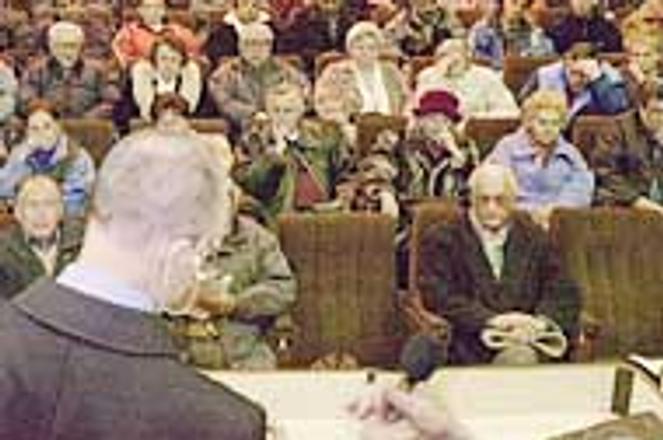ANGRY DEPOSITORS were summoned by civil activists to attend a protest meeting in Košice February 26.photo: TASR
THE GOVERNMENT is facing the anger of thousands of people terrified they have lost money put into savings and loan funds that have shut down operations.
An announcement February 24 that the company AGW had stopped payment of interest and principal to its clients was followed hours later by news that one of the biggest non-banking financial companies in the country, BDV Družstvo, daughter company of the Drukos joint-stock firm, was to close its offices as well.
Hundreds of panic-stricken depositors rushed to local branches of the two firms to find the doors already shut.
Many immediately rounded on the government for failing to protect their savings. Some said they had invested hundreds of thousands of crowns and were both angry and confused at the potential loss of their money.
The halting of the two companies' activities came amid rising panic over the security of non-banking entities following the collapse in February of another two similar firms, BMG and Horizont.
Drukos owner František Mojžiš said that he had been motivated to close BDV partly by fears of a run on his firm in the growing panic.
"I know that now fear will spread," he said. Mojžiš also suggested that certain groups had fomented unrest so that they could buy shares in BDV cheaply from people worried about the future of the firm, and through those shares take a majority in Drukos.
"Another reason behind this measure is the brutal power against us," he said.
AGW representatives said they had been forced to halt operations because more than 95 per cent of clients had asked for their deposits to be paid out in full.
The government was blamed by opposition parties as well as a number of BMG and Horizont clients for not doing enough to regulate the activities of those companies before they crashed.
Those calls have been repeated in the wake of the AGW and BDV shut-downs, and with just a few months before election campaigning begins, the opposition HZDS party has attacked the government for not acting on what it claims was knowledge that both companies were in financial trouble.
Jozef Božík, vice-chairman of the HZDS, said: "That they did not, and still do not, act leaves them responsible for the losses of thousands of Slovak citizens."
All four firms have offered huge interest rates on investments, some as high as 40 per cent, and taken billions of crowns in deposits. BDV Družstvo and AGW have collected nearly Sk6 billion from 50,000 clients between them, while BMG Invest is estimated to have drawn in Sk4.5 billion from hundreds of thousands of others.
Brokers and financial market specialists have warned for years that companies offering such high interest rates were dangerous.
But the government has refused to accept blame for the situation in the four firms.
Deputy Prime Minister for the Economy Ivan Mikloš said that "the government has no responsibility" in the matter. PM Mikuláš Dzurinda said after Mojžiš's announcement that he was sorry for the people who may have lost money, but maintained there were adequate laws in place governing the activities of non-banking companies.
As of January 1 this year new legislation was introduced requiring non-banking finance entities to submit company details to the Financial Markets Office.
Dzurinda also pointed out that during its term the government had run media campaigns urging the public to think carefully about depositing money in such firms.
But Mikloš and Justice Minister Ján Čarnogurský are facing calls from within the ruling coalition to act on the crisis.
On February 24 the Democratic Left Party (SDĽ) demanded Mikloš and Čarnogurský take measures immediately to ban the operation of all non-banking finance institutions. SDĽ members said the company's assets should be used to repay clients' deposits if lost.
The calls were toned down days later but SDĽ member and Minister for Labour and Social Affairs Peter Magvaši said the government must act to "calm the panic" among AGW and Drukos clients.
SDĽ officials say they will discuss whether or not to press the government further on compensation for depositors if the firms declare bankruptcy, while the coalition Party of Civic Understanding (SOP) has said at least a part of the deposits should be paid by the state should the firms collapse.
Some political observers are now suggesting that opposition parties will use the discontent of depositors to galvanise their own support and attract undecided voters.
"This could have an impact on pre-election developments. Many of the people who invested there were probably opposition supporters or undecided voters," said Grigorij Mesežnikov, president of the IVO think-tank.
"The government has no direct responsibility in this - that responsibility lies with the investors - but the opposition now has an opportunity to mobilise support. I expect they will take it."

